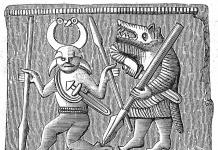The image of a cloud from Lermontov's poem "Cliff".
At the literature lesson, we read a poem by Mikhail Yuryevich Lermontov "Cliff". M.Yu. Lermontov is a famous Russian poet who lived in the 19th century. Lermontov lived for only 27 years. The poet died in a duel in Pyatigorsk. In the poem "Cliff" there are two lyric heroes. This is the cliff itself and the cloud that slept on it. In the first lines of the poem, the image of a cloud evokes positive emotions. This is evidenced by the word "cloud" itself. It is not a big black cloud, but a small cloud. The epithet "golden" emphasizes the light and joyful nature of the cloud. Creating the image of a cloud in the first quatrain, the poet uses colors. It is the color of gold and the color of azure. It seems to me that the cloud is golden, because the morning sun has painted it golden. The golden color is bright and rich. The azure color is the color of the sky. The color blue is often used by poets. It seems to me that the color of azure is the color of freedom. After all, the sky is huge, a small cloud can freely "run" across it in any direction. It seems to me that the first quatrain is free and joyful precisely because of the image of a cloud drawn by the poet. The second quatrain begins with the word "but." this word takes away joy, youth, life. The cloud rushed away. The giant cliff turns into an old cliff. I think that the cheerful golden cloud took everything with it, leaving only memories to the old cliff. There was a "wet footprint" on the chest near the cliff. It seems that the cliff was crying, saying goodbye to the cloud. I sympathize with the cliff. After all, a cloud can meet its sisters in the sky, it can "spend the night" on any mountain. And the old cliff will wait a long time and remember only one golden CLOUD, which he remembered until the end of his life. But I think that the cloud should not be judged. She is small, young. She wants to live free. And the cliff is old. He has already seen a lot in his life. A cloud must see Big world, and the cliff can remember those moments that life gave him.
The life and work of the great Russian poet and writer M. Yu. Lermontov seem like a bright flash of lightning in the dark sky. This talented person did not live to be 30 years old, but still managed to leave behind a great legacy of works saturated with meaning, love for the homeland, nature and his people. Lermontov wrote the poem "Cliff" in 1841, a few weeks before his death. Although many bibliographers are sure that the poet guessed about the end of his mortal existence on earth, in this work there is not even a hint of parting or something like that.
Lermontov composed the verse "Cliff", being in admiration of the surrounding landscapes. His inner world he perceived nature in a special way, the poet treated it as a living being. Although the work is saturated with romance, it cannot be called happy. In just two small quatrains, Mikhail Yuryevich was able to convey a deep sense of life.
Most literary critics agree that when writing the poem "The Cliff" Lermontov wished to unite the spiritual with the material, to compare the divinity, the unearthly beauty of a cloud and the everyday life, the mundane essence of the stone. People very often forget about their soul, focusing on the body. The author wanted to remind that harmony can be achieved, but only by combining these two principles.

Some researchers of the poet's work interpret the meaning of the poem a little differently. They believe that, composing "The Cliff", Lermontov wished to depict the fate of two people who are unlike each other. A cloud can symbolize a young beauty full of vitality and happiness. In turn, the cliff is a far from young, wise man with life experience. Looking at the windy stranger who is suitable for fathers, he clearly understands that his time has passed, joyful days are in the distant past. A man feels good in the company of a girl, she brightens up his gray everyday life, but when she goes to her friends and girlfriends, he only more clearly feels his worthlessness and loneliness, realizing that there is no place for him in the world of young people. A soul without a body can be, it is very happy, returning to another world, but the earthly shell cannot do without it, it suffers and cries. Lermontov created a striking contrast between the material and the spiritual world. "Cliff" is a poem that contains a deep hidden meaning. The cloud is depicted as weightless, cheerful and cheerful, but the steep rock is seen by the reader as old, unhappy, tired of life.

M. Yu. Lermontov's poem "Cliff" can be called autobiographical to some extent. Of course, the poet was not literally an old man, but even among his peers he felt like a stranger. Mikhail Yurievich matured very early, his worldview and wisdom show in him a person who is wise with life experience. He was tired of his own life, of the darkness surrounding him. Lermontov could not find happiness, so he could only come to terms with misunderstanding and doom himself to loneliness.
One of the brightest and most impressive landscape-philosophical works of Lermontov, relating to his late period of creativity, is his poem "Cliff" (1841), written shortly before the premature death of the outstanding poet. And although at that time Lermontov was in a difficult state of mind, and according to the testimony of some eyewitnesses, he even foresaw the imminent end of his mortal path, in the poem "The Cliff" there is no hint of goodbye or anything like that. Readers first met him in 1843, when he was published by the literary journal Otechestvennye zapiski 2 years after Lermontov's death.
The main theme of the poem
This work great poet created, being under the influence of the magnificent views and landscapes of the surrounding nature of the Caucasus, to which he treated with special trepidation and turned in his works into Living being able to think, feel and experience.
The poem "The Cliff", imbued with the spirit of spiritualized romance, can hardly be called optimistic, its main theme is once again the loneliness of the protagonist (in this case, it is a cliff with which the author also personally associated himself) in the world around him, the feeling that he is a stranger and superfluous in this life.
The amazingly beautiful landscape sketch of southern nature, which was conveyed with such skill by the genius poet in two small quatrains, is filled with the author's heavy emotional experiences, it wears a deep philosophical meaning and has several interpretations.
Some literary critics say that the author's goal in this work was the intersection and comparison of material and spiritual values, the answer to the question of what role they play in our life and which of them is more important. The cliff in this case plays the role of everything worldly and ordinary, and the cloud is something ephemeral, unearthly and divine. Their union was short-lived and accidental, a cloud leaves the cliff in the morning and he remains in the same place in sadness "he cries quietly in the desert." So Lermontov wanted to show people how often they, first of all, taking care of the essentials, forget about their soul, and after all, real happiness and harmony can be achieved only by combining these two principles. According to the poet, the soul is eternal and, like a golden cloud, can travel anywhere without any harm to itself, while a body (rock) without a soul will forever torment and suffer. The beauty and carelessness of the golden cloud and the old, wrinkled cliff emphasize the difference between the concepts of the material and spiritual world.
There is also an opinion of literary experts that the poem "The Cliff" is dedicated not to the unity of two principles, but to the description of human relationships of completely dissimilar people, in which a cloud is a young and frivolous person, and a giant cliff is a middle-aged, experienced man, suitable in age her fathers. The poet describes their short moment of communication, which seemed very pleasant for both of them, but he soon got bored of the young charming woman and, for example, she found herself a company that was more suitable for her age or interests. And a rather middle-aged man, like an old and wrinkled giant rock, remains out of work and acutely feels his loneliness, uselessness, a feeling of deep sadness and confusion.
Structural analysis of the poem
When writing the poem, the author used a five-foot trochee, as well as a two-syllable foot, which has an accent on the first syllable, and encircling rhyme is used. The mood of the two quatrains is diametrically different from each other, the first is saturated with a sense of cheerfulness and fun, the second - sadness and sadness. To fully convey the feelings and mood of this work, the poet used the following means of artistic expression: personification (a cloud spent the night, rushed away in the morning, the cliff was thinking, the cliff was crying), metaphor (playing on azure, a giant cliff), epithets (golden cloud, old cliff) , paraphrase (wet trace in the wrinkle of the cliff - traces of tears). The alternation of the sounds "r", "l", "v" (alliteration) and the repetition of the sounds "o" and "a" (assonance) gives the piece a special smoothness and expressiveness.
The poem "Cliff" can be called autobiographical in many ways, because it reveals the deep inner world of the poet with his experiences and feelings, it is distinguished by deep meaning and ambiguity, in it everyone will find something of their own, close and understandable only to him.
A golden cloud slept
On the chest of a giant cliff
Playing on the azure merrily;
The old cliff. Alone
He stands thinking deeply,
Analysis of the poem by M.Yu. Lermontov "Cliff" for schoolchildren
The work of the great Russian poet belongs to the late period of creativity. The leitmotif of the poem "The Cliff" is the idea of the loneliness of love. Mikhail Yurievich Lermontov talks about what love is.
In this poem, two main characters appear before the reader: a golden cloud and a giant cliff. The poet offers his philosophical vision, in which relations between people are transferred to the events of nature, and through the prism of natural phenomena, we study the thoughts and feelings of people.
The heroes of the work are two opposite images. The golden cloud is a light, flying, very delicate beauty. It reveals a playful mood, light love and openness to this world. The free playful cloud attracts the giant cliff. He is big and heavy, standing alone in the middle of the desert. Perhaps he alone can become a friend for a cloud wandering over the silent desert. And between them there is a connection, as between kindred spirits. The author writes about the relationship between a cloud and a cliff:
A golden cloud slept
On the chest of a giant cliff ...
For her, the cliff became a night haven that could shelter her on his chest. For him, the cloud became a fleeting entertainment, which he dreamed of in the middle of the desert.
The desert became the place where two living creatures met, who are filled with feelings and are able to love. Their senses connected for a short moment. It was as if a spark had passed, generating warmth in the chest of the old cliff. But a few other experiences in a light, easy cloud. Her thoughts are lighter, her feelings are not so deep. And in the morning she goes on the road without regret, not worrying about the feelings of the cliff. The author sees it like this:
In the morning on the road she rushed away early,
Playing on the azure merrily;
But there was a wet trace in the wrinkle
The old cliff.
Here we read about how different the feelings of two creatures in love are. Let them meet and be filled with mutual sympathy, but this is temporary. It is about the short-term happiness of love that a lonely cliff cries:
Alone
He stands thinking deeply,
And he cries softly in the desert.
The poem evokes sympathy for the poor cliff. Perhaps these are autobiographical reflections, and the relationship between a cloud and a cliff reveals events from the life of Mikhail Yuryevich.
This poem teaches us to feel each other more deeply, to take care of loved ones. This is a very instructive example of how the author manages to convey his experiences using the technique of allegory and transferring the relationship between people to natural phenomena.
Respect and recognition of the work of Mikhail Yuryevich Lermontov, the study of the features of his poetry form the right relationship and educate the personality.
The poem "Cliff" refers to latest works M. Yu. Lermontov: it was written by him in 1841, a few weeks before his death. It was first published in 1843 in the journal Otechestvennye zapiski.
The poem refers to landscape-philosophical lyrics: a philosophical meaning is organically embedded in the beautiful landscape sketch of the southern nature.
Main theme poems - the loneliness of a person in vast world- is revealed with the help receiving impersonation... Strengthens the motive of loneliness by breaking sentences in stanzas, logically highlighting the word "alone"... The use of the word serves the same purpose. "desert", traditionally symbolizing in romantic poetry loneliness.
The work is based on parallelism between human life and by nature: human experiences and actions are transferred to the old cliff and the golden cloud. Composition"Cliff" is built on contrast of the main characters- clouds and cliffs, created using various means: grammatical categories (characters are denoted by masculine nouns and female), using the antithesis ( the cloud plays merrily - the cliff is crying, the cloud is young - the old cliff), particles "but" at the junction of the stanzas. The psychological contrast between the main characters is created with the help of opposite rows of personifications: if a cloud "Rushed off, playing cheerfully" then cliff "Stands alone", "Thought deeply", "Crying quietly"... The dynamism of the cloud is emphasized by the verbs of action, while the cliff, on the contrary, is static. The cloud symbolizes an easy and carefree attitude towards life, and the cliff symbolizes a more solid attitude towards life.
The two stanzas of the poem are diametrically opposed in terms of the mood they create. The cheerful and cheerful sensations in the second stanza disappear, as if "A cloud has rushed away", giving way to a sad and sad mood that turns the giant cliff into an old and lonely cliff.
The poem has p different interpretations... Perhaps the problem of human relations is reflected in "The Cliff", and the heroes symbolize a windy beauty and a man wise in life. In the soul of an already elderly gentleman, an accidental guest leaves a deep imprint and sadness caused by the memories of a long-gone youth.
Another interpretation of the poem sees spiritual and material principles in the images of the cloud and the cliff, believing that in the "Cliff" it comes about the unity of these principles and the search for spiritual harmony. The image of a cloud symbolizes the unearthly, divine principle - human soul... The rock, firmly standing on the ground, embodies the material, worldly principle. The soul is absolutely free, it can, without experiencing pain, exist without a body. A body without a soul is doomed to eternal suffering, "Crying softly in the desert"... True harmony is possible only with the unity of soul and body.
"The cliff" is written five-foot chorea, two-syllable foot with stress on the first syllable. Lermontov used to write girdle rhyme.
Among means of artistic expression prevail impersonations (the cloud slept and ran away, the cliff is crying, stands, thought). The work is given special expressiveness metaphors (across azure, giant cliff),epithets (golden cloud, playing fun, old cliff), periphrase (Wet footprint- tear) and alliteration sounds "r", "l", v ". The smoothness of the poem is achieved through the use of assonance"O" and "a".
The poem "Cliff", revealing the inner world of the poet, encourages a person to strive to achieve inner harmony, the ability to live in harmony with yourself and the world around you.
- "Homeland", analysis of Lermontov's poem, composition
- "Sail", analysis of the poem by Lermontov
- "Prophet", analysis of the poem by Lermontov



































